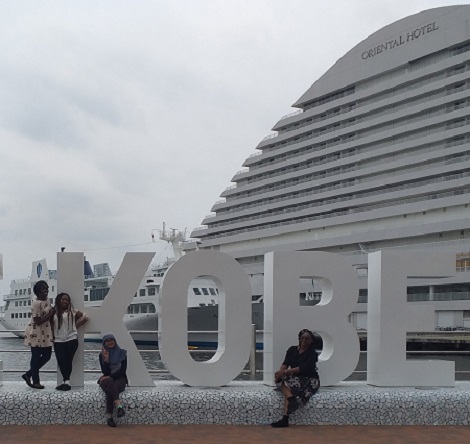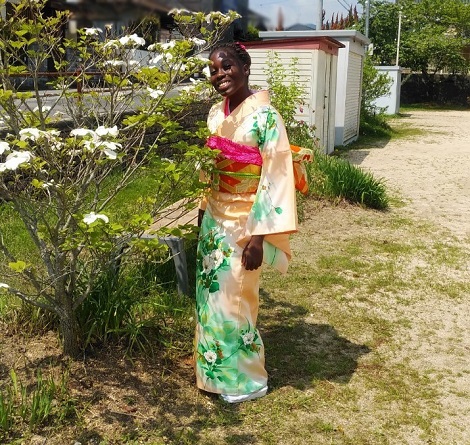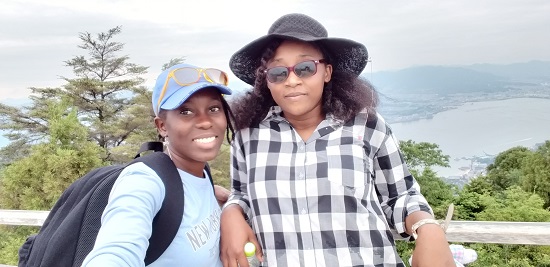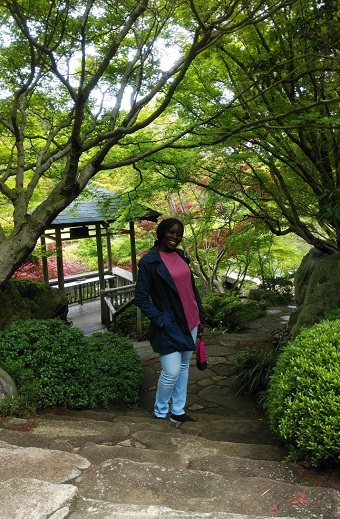‘I would like to become a geologist and share what I will learn here in Japan with young Gabonese’
Name: Larissa Ngombi Mavoungou
Home Country/Region: Gabon
Affiliation: Intensive Japanese Language Training Program (Morito Institute of Global Higher Education)
* Starting in October 2019, enrolling at the Graduate School of Science as a doctoral student.
Hobbies: Loves singing and listening to music, and also playing the guitar.
(Date of Interview: June 25th, 2019)
First of all, could you tell us about your hometown?
I am from Libreville, the capital and biggest city of Gabon, in Central Africa. Libreville is located along the coast of South Atlantic Ocean and has a nice and lively environment. Our country became independent from France in 1960, and after that we have never had any civil wars or conflicts. So it is a very peaceful country. Also, we are blessed with various natural resources such as oil, gas and mineral resources.
Could you tell us about your academic background?
Sure. After finishing high school, I attended the University of Sciences and Techniques of Masuku in Gabon from which I got my bachelor’s degree in Geosciences and Environment. In 2012, I graduated and went to France to enroll at the University of Lille for the first year of Master's and then at the University of Lorraine for the second year of Master's. In 2014, I earned my master’s degree and went to Houston, Texas (U.S.) to learn English and spent 1 year there. After that, I went back to Gabon and worked for a water drilling company for about 1 year.
What did you do at the company?
We looked for water under the ground. We drilled and took the water from the ground using pipes and pumps. Water resource is very important in Gabon because, as we are in an equatorial region, there is heavy rainfall throughout the year and then we have a lot of water under the ground. And the natural water in Gabon is of very good quality. It’s pure and safe. Of course we have to do some treatment before drinking, but not that much.
I heard you were involved in some volunteer activities in Gabon. Could you tell us more?
Yes. After I went back to Gabon from the U.S., I got involved in many activities related to English. For example, I used to help high school students, mostly 12th graders (17-18 years old), with English to help them prepare for their exams and get their high school diploma.
What do you think of English spoken by Japanese?
English spoken by Japanese? (laughter) Well, I think here in HU there are a lot of people who speak pretty good English. But sometimes, they speak some words with the Japanese ‘heritage’. They pronounce English words the Japanese way. For example, when they say ‘rice’, we hear ‘laisu’. ‘Friend’ ends with a ‘d’, but I hear Japanese say ‘furendo’, maybe because most Japanese words end with a vowel sound, not a consonant sound.
Why did you become interested in Japan?
Well, I was looking for a new opportunity to study abroad, because I really like travelling. As I told you, I went to France, and then to the U.S., and some other countries too. And as I heard about MEXT scholarship, I wanted to make use of this opportunity. And I knew that Japan has very good universities and a great educational system. I also made some research about Japan by watching some videos featuring Japan that I found very interesting. In such videos, people would say that Japanese people are very organized, and are respectful of rules. At the traffic lights, people won’t cross the street if the light is not green. It's not like that in my country. In my country, if it (the traffic light) is red, people will just look left and right, and if there is no car, they will cross (laughter). And I heard that the Japanese culture is kind of a wonderful mix of traditionalism and modernism. Actually I was not surprised at all when I got here; most of the things I’ve heard back in my country about Japan are actually true. I’m witnessing those things right now.
So there’s no culture shock?
Of course it’s very different from my country, but I’m not shocked. I’m just amazed at how people are so kind, so nice, and so respectful. Like in the streets, if you don’t know your way, you would ask somebody and if it is not too far, the person would take you to the place you want to go to. I've been helped by many Japanese here. They would help me to call a taxi to go back to the dormitory. And everything is so clean here. That’s the shock! I’ve travelled a lot, but I think the cleanest cities I’ve seen so far are here in Japan. And I like HU campus too. It’s very big, and beautiful with flowers everywhere. I like the ambience with a lot of colors, so I think it’s a very nice campus.
What are you studying on now at HU?
Right now in HU, I am taking the Intensive Japanese Language Training held by the Morito Institute of Global Higher Education. I’m taking that for 6 months, so I have 3 months remaining. It’s Japanese ‘intensive’ training, so we study a lot. But it’s very interesting because the teachers are nice. If you don’t understand something, they will take the time to explain to you what you don’t understand. And they try to make it fun. So we learn a lot, and we laugh a lot. I like the Japanese classes.
And in October, you are starting your Ph.D. study at the Graduate School of Science. Could you tell us about your major?
My major is geology. Geology is the ‘study of the earth’, and it’s a very broad field. You can use geology in many, many different domains. For example, you need geologists to find underground water resources. Or for natural mineral resources such as manganese and gold, or even for oil and gas, you will need geologists for exploration. They would explore around using some methods, such as ‘seismic method’. It is like the ultrasound scan of the earth. You can actually see the structure of the subsurface and then from that and some other data, you can find where the resources are. Geology is very useful for construction too. Before making a 10 floor building, you want to make sure the foundation is strong enough to sustain the building and that the environment is not prone to natural disasters such as landslides. And you will need to carry out some geological studies for that.
Thank you for your kind explanation. Why did you choose to study geology in the first place?
I became interested in geology in my first year of university. I got interested in that maybe because of the environment of my country. We are a little country with a lot of oil and gas resources, so I wanted to become a part of finding resources.
How about Hiroshima’s, or Japan’s environment? Is it interesting for you?
Well, you must be talking about the shortage of natural resources in Japan. Yes, you don’t have a lot of natural resources, but I decided to come here to study geology because Japan is a high-technology country. There are a lot of technologies which are great, so I can learn many techniques here in Japan, and then use them in Gabon and many other countries. Also, the geology in Japan is very complex, very interesting, so I can learn a lot here.
How do you spend your free time?
When I’m not in class, I go out and hang out with my friends. We’d go to karaoke (laughter) and sing or travel because I really like travelling. We have already been to Hiroshima city, Miyajima,and Kobe, and we would like to visit many other cities. I also like shopping. Most of the time, we buy clothes and shoes. We shop a lot! Japanese fashion is full of variety, and I think Japanese girls are very fashionable.
Have you tried Hiroshima-style Okonomiyaki?
Yes, I really like Hiroshima-style Okonomiyaki. When I stayed over at my host family’s house, I made Okonomiyaki with my host mother. And it was good. The first time I ate Okonomiyaki was at a restaurant in town, but I didn’t like it so much. But when my host mother made it, it was good. So far, that’s the Japanese food that I like.
You came to Japan in April, so you’ve never experienced Japanese winter, right?
No, actually I’ve not. But I came in early April and it was very cold. I was surprised. It was spring according to the calendar, but for me, it was quite cold. Coming from a hot environment to a cold country like Japan, the transition hasn’t been easy, so I don’t know how the real winter will feel like (laughter).
In Higashihiroshima city, winter is quite cold, and we usually have some snow. Prepare warm jackets, and enjoy your first winter here. By the way, do you have any advice for students who are thinking of studying abroad?
Yes, I would say ‘Just come!’ It’s a very great experience to study abroad, as you can meet a lot of people from different countries. Here in HU, I have met people from Cameroon, Ghana, Indonesia, Malawi, and many other countries that I had never imagined that I could meet. And as I said, Japan is a great country, I am so glad that I have the opportunity to be here. I am actually witnessing that Japanese people are so great, the culture is amazing. So I would advise people to come to Japan. You will gain a lot. You won’t lose anything!
In addition, I would advise you to do some research about Japanese culture. Go on YouTube, watch lots of videos and try to learn at least some Japanese words. For example, ‘Sumimasen’ (Excuse me). When you get to Japan, almost everything is written in Japanese. I’m sure you would ask people for some help. In order to address them, you need to say ‘Sumimasen’. So it’s a very useful word. You can’t come to Japan without knowing this word (laughter).
By the way, many people say that because of AI (Artificial Intelligence), our society will change dramatically over the next decade. What do you think of that?
From day to day, the world is evolving. Especially here in Japan, the technology is highly developed. I see things I’ve never seen before in my country. For example, in the restrooms, you can just push the button for the toilet cover to open and close. Or you can just place your hand over the sensor and it will flush automatically. That’s very-very interesting and I think we need that.
When we talk about inventing those things, it is to meet the needs of people today. I think it’s great but then, we still need people. Some people predict that many people will lose their jobs because of AI, but I’m sure we cannot get rid of people from the society. There are some things that robots cannot do. It’s ‘socializing’. It’s good to use AI, but we should give people the opportunity to work. It’s going to help them interact with each other. If we get rid of people and use just AI, I think human beings are not going to socialize anymore. And it’s not going to be fun at all.
What is your dream for your future?
I would like to get my Ph.D. degree and enter an oil and gas company, and work as a geologist in the exploration department so that I can explore places and help find resources. Besides that, I would like to teach part time in a university. We don’t have so many geologists holding Ph.D. in Gabon, so I think there is a need for lecturers in geology. So I would like to share what I know, what I will have learnt here in Japan with Gabonese students.
In front of the Graduate School of Science where she will start her Ph.D. study in October
Lastly, are there any comments you would like to add?
I would just like to say that I am very glad to have this opportunity to study here in Japan. I know I am going to learn a lot. I’ve already started to learn a lot. I really like the Japanese language although I am struggling with the kanji (Chinese characters used in Japanese) right now. I really enjoy being here, I like my experience. And my host parents are so kind and try their best to get me immersed in the Japanese culture. I have no regrets at all and I would advise everybody to visit Japan. It’s a great country.
I hope your study in HU will be a wonderful experience, and your future dreams will come true. Thank you very much for your time today.
It’s my pleasure. Thank you too.
Photo Gallery

Enjoying the attractive sites and the beautiful scenery of Kobe with my friends

First Kimono experience

Mesmerised by the wonderful sight from the top of the mountain in Miyajima

Visiting the peaceful Hiroshima Airport park


 Home
Home